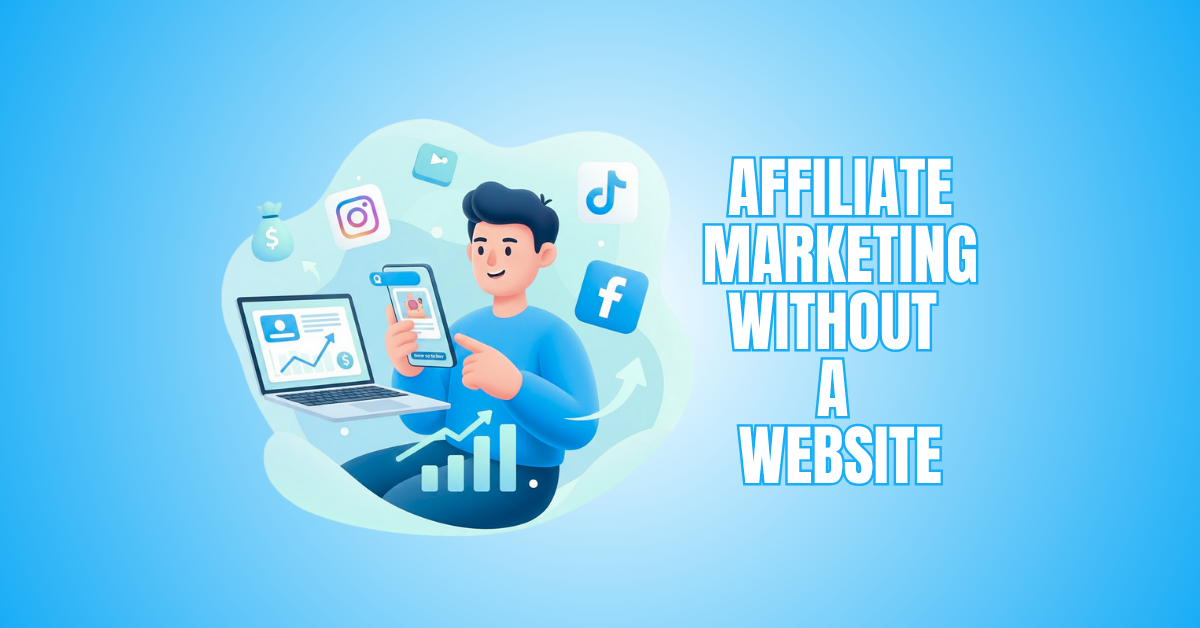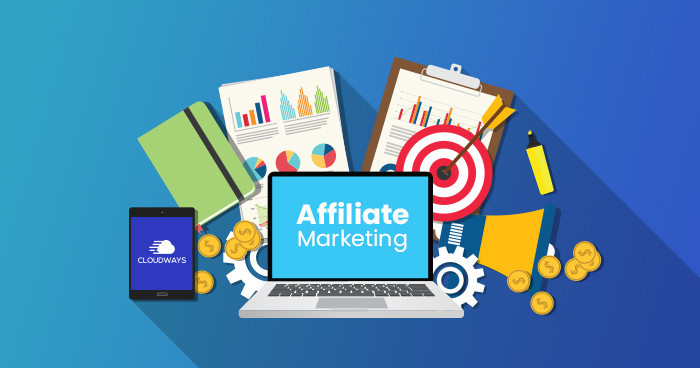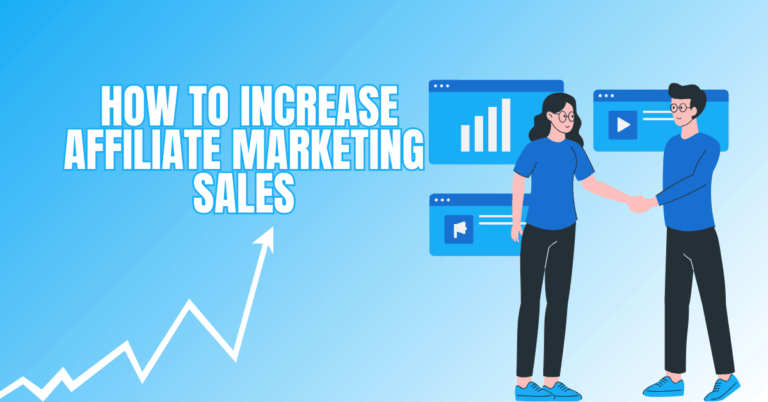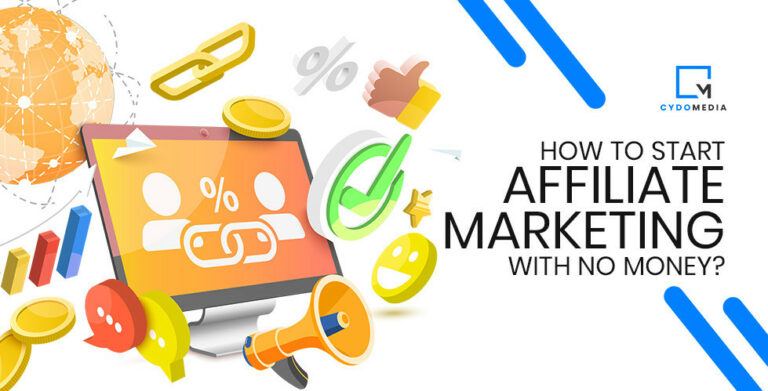Affiliate Marketing Without A Website: Quick Success Guide
Affiliate marketing is entirely feasible without a website, and it's now simpler than ever to get started. You don’t need hosting, tech skills, or expensive tools to begin earning.
With the right platforms, innovative promotion methods, and simple content strategies, anyone can turn affiliate links into real income. This guide breaks everything down step-by-step so you can start confidently, even as a complete beginner.
What Is Affiliate Marketing Without A Website?
Affiliate marketing usually means writing blogs and ranking on Google. But that’s not the only way. You can promote affiliate links on platforms you already use. Social media, YouTube, email, forums, and even chats can help you reach people fast.
The idea is simple. You recommend a product, share your unique link, and someone buys, and you earn a commission. No website required. Your platform becomes your “website.”
Now let’s look at all the methods you can use.
1. Social Media Marketing
Social media makes affiliate marketing easier because you already have an audience, even if it’s small. People trust creators who share helpful, honest recommendations instead of hard-selling.
Post simple tips, quick demos, or real experiences related to the product you promote. Incorporate your affiliate link into the profile or captions. Engage with followers, reply to questions, and keep content consistent.
Short videos and carousel posts work great. Social platforms reward helpful content, so you can grow fast without paying for ads or maintaining a website.
2. YouTube Without A Website
YouTube is a powerful affiliate platform because people search for product reviews, tutorials, and comparisons every day. You can make videos without showing your face using slides, screen recordings, or stock clips.
To ensure that readers see your affiliate link right away, include it in the description and pin it in the comments. Create simple, helpful videos that answer specific questions.
Even short, low-budget videos can bring traffic for years because YouTube continues recommending applicable content. This makes it a long-term, no-website passive income method.
3. Email Marketing Without A Website
You can build an email list without owning a website by using free landing page builders like MailerLite or Systeme.io. These tools let you collect subscribers through a simple one-page opt-in form.
Create a small lead magnet, such as a checklist or cheat sheet. Then send helpful emails and naturally include your affiliate links. Email marketing works because it’s personal and consistent.
People who join your list already trust you enough to hear from you, making them more likely to click and buy through your recommendations.
4. Facebook Groups Affiliate Marketing
Facebook Groups provide targeted audiences already interested in specific topics. Instead of posting links randomly, join niche groups and become genuinely helpful.
Answer questions, offer advice, and share product insights. When someone asks for a solution, politely share your recommendation and offer to send the link. This prevents bans and keeps the community supportive.
You can also create your own group to build long-term influence. Groups convert well because people see real discussions, real problems, and real solutions shared by real members.
5. Pinterest Affiliate Marketing
Pinterest works well for affiliate marketing because users actively search for ideas and products. You can create pins featuring the item you promote and link them directly to your affiliate URL or a free landing page.
Pinterest traffic lasts long since pins stay searchable for months or years. This brings ongoing clicks without daily posting.
Focus on visually appealing pins, helpful text overlays, and descriptive keywords. Pinterest is ideal for niches such as home décor, beauty, fashion, recipes, and gift guides, making affiliate sales easier.
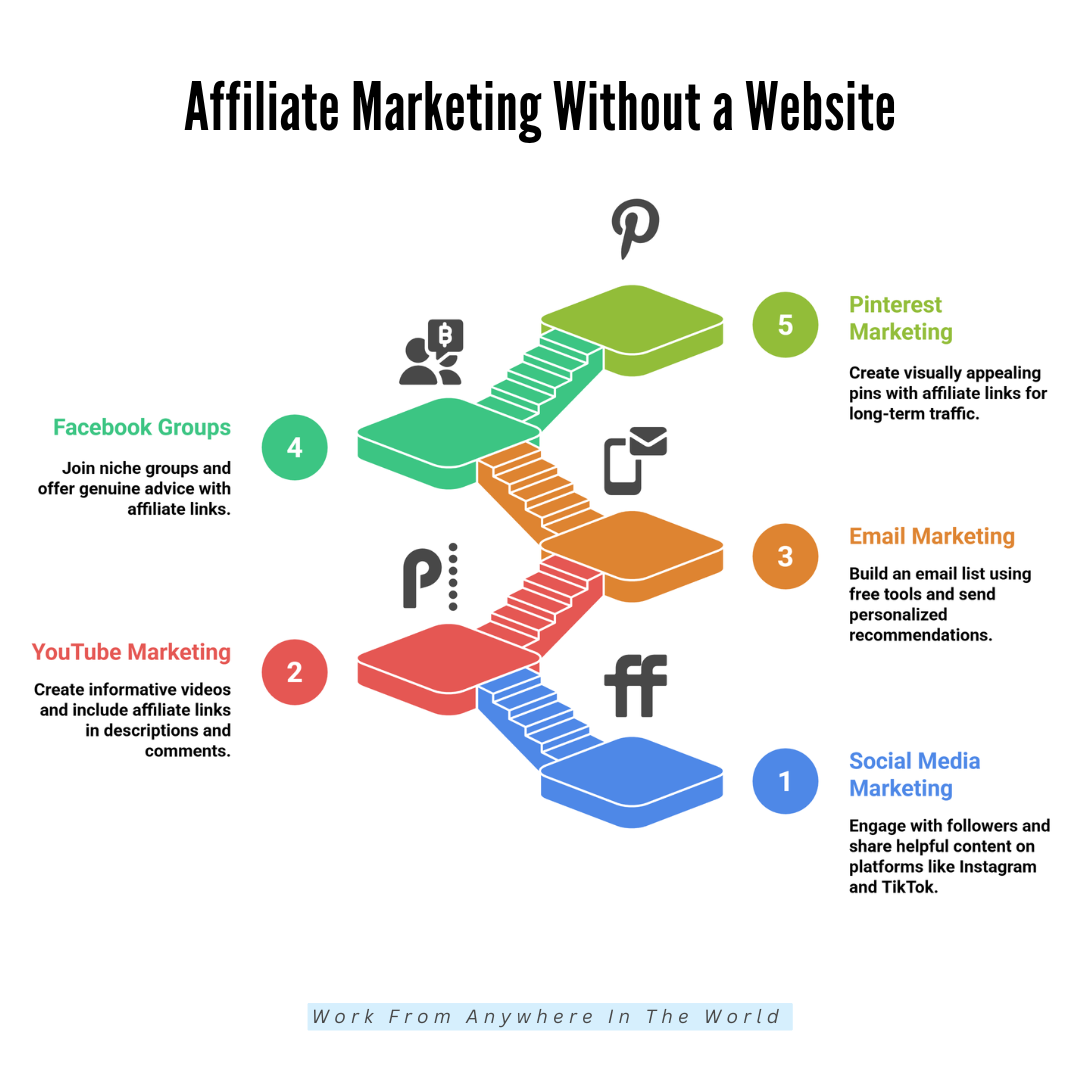
6. Reddit Affiliate Marketing
Reddit offers niche communities where people ask highly specific questions. Build karma by participating in discussions before sharing anything promotional. Many subreddits allow affiliate links if they’re relevant, honest, and valuable.
Write thoughtful replies that explain the problem and offer the product as one solution. Reddit users value transparency, so be upfront about recommendations.
Long, detailed answers perform well and stay visible for months. If your advice genuinely helps, people will trust you and click your link. This method brings targeted traffic without needing a website.
7. TikTok Affiliate Marketing
TikTok’s short video format makes affiliate marketing fast and engaging. Create quick demos, product reveals, or “things you didn’t know you needed” videos. Use trends, voiceovers, or simple storytelling to highlight the product’s benefits.
Place your affiliate link in your bio using a link hub like Linktree. TikTok’s algorithm pushes helpful content even from small accounts, giving you a chance to reach thousands organically.
Consistency matters—post daily or several times weekly. Authentic reactions and real usage examples convert extremely well on this platform.
8. Quora Affiliate Marketing
Quora helps you reach people actively seeking answers, making affiliate recommendations natural and effective. Write detailed answers that explain problems clearly and offer product suggestions as part of the solution.
You can place affiliate links only where allowed or direct users to a free landing page for safety. Strong answers often rank on Google, giving you long-term traffic. Focus on delivering helpful, honest insights.
The more useful your responses, the more upvotes you’ll gain, increasing your visibility and potential earnings without needing a website.
9. WhatsApp And Facebook Messenger Affiliate Marketing
WhatsApp and Facebook Messenger allow direct, personal communication, which boosts trust for affiliate recommendations. Share helpful product suggestions with friends, family, or niche groups, but avoid spamming.
Create small interest-based groups where you regularly share tips, resources, and product insights. When conversations feel genuine, people appreciate your help and click your link.
This method works well for niches like beauty, gadgets, health tools, and recipes. Because messages are personal, conversions are often higher than public posts. It’s simple, fast, and perfect for beginners.
10. Forums And Online Communities
Forums gather people with shared goals and problems, making them ideal for affiliate marketing. Register in communities related to your niche and answer questions thoughtfully.
Many forums allow signature links, which can include your affiliate link or a landing page. Provide value first—explain solutions, share experiences, and compare options. Users trust helpful contributors more than aggressive promoters.
Forum posts often stay indexed in search engines, bringing ongoing exposure. This method thrives on patience and authenticity, helping you build authority without needing your own website.
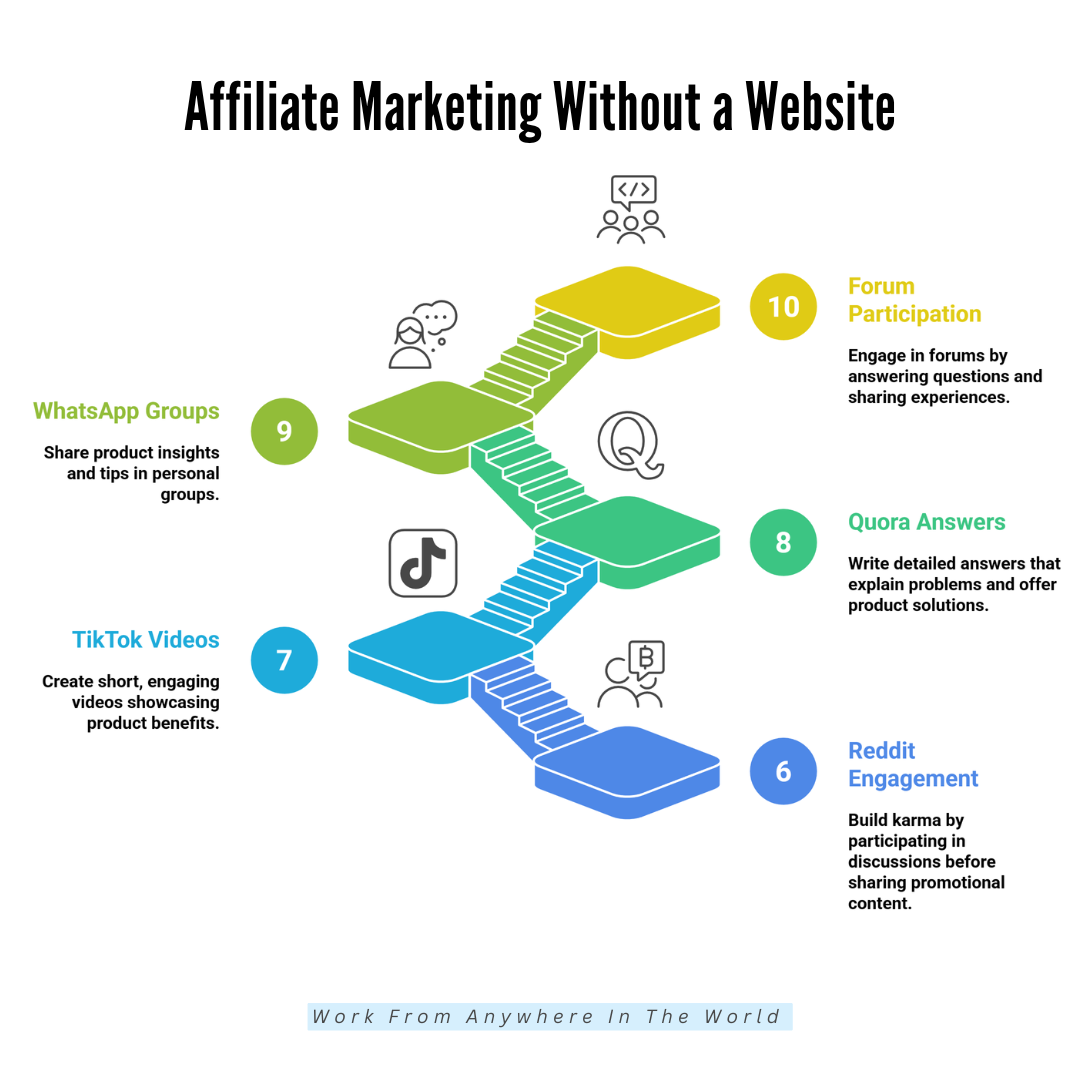
11. Free eBook Or PDF Guides
One clever technique to advertise affiliate products without a website is to create a free PDF guide. Write a short, helpful eBook that solves a specific problem, and naturally include your affiliate links throughout the content.
Offer it for free through social media or messaging apps. Readers save PDFs, share them, and revisit them later, giving your links long-term visibility.
Focus on value—step-by-step guides, tool lists, or cheat sheets work great. Once downloaded, your PDF becomes a continuous source of potential sales without extra effort.
12. Link Hubs And Link Shorteners
A link hub like Linktree, Beacons, or Stan Store lets you organize multiple affiliate links in one simple page. This serves as your mini-website, making it easier for followers to browse your recommendations.
Place the hub link in your social media bio or video descriptions. Use clear labels like “Best Tools I Use” or “Shop My Favorites.”
Link shorteners like Bitly help track clicks and create cleaner URLs. This method is perfect for beginners who want structure without building a website.
Thinking About Growing Beyond Social Media?
You can succeed in affiliate marketing without a website — but if you ever want your own space online,
Wealthy Affiliate offers free training, hosting, and tools to help you build when you feel ready.
13. Free Blogging Platforms
Platforms like Medium, LinkedIn Articles, Blogger, and Substack allow you to publish long-form content without owning a domain.
These sites have built-in audiences and rank well on search engines, giving your articles visibility faster than new websites.
Write helpful reviews, listicles, and how-to guides with affiliate links placed naturally. Focus on problem-solving content that readers search for.
Since the platform handles SEO and traffic, your job is to write value-packed articles. Over time, these posts bring stable clicks and passive affiliate income.
14. AI-Generated Content Support
AI tools help you create affiliate content faster, even if you’re not a skilled writer. You can generate scripts, captions, product reviews, eBooks, and more in minutes.
Use AI to brainstorm ideas, improve clarity, or make content more engaging. This allows you to stay consistent across multiple platforms without burning out.
AI can also help you rewrite content for different formats like TikTok, YouTube, or Pinterest. You still provide human touch and strategy, but AI saves time and boosts your overall productivity.
15. Choosing The Right Affiliate Networks
Selecting the right affiliate network matters because payouts, products, and trust levels vary. Networks like Amazon Associates, ShareASale, Impact, ClickBank, and Digistore24 offer thousands of products across different niches.
Choose a network based on your audience’s needs, your niche, and commission rates. Some platforms offer recurring commissions, which grow your income over time.
Test different products to see what converts best. The right network helps you scale faster without managing a website. A good match between product and audience drives higher earnings.
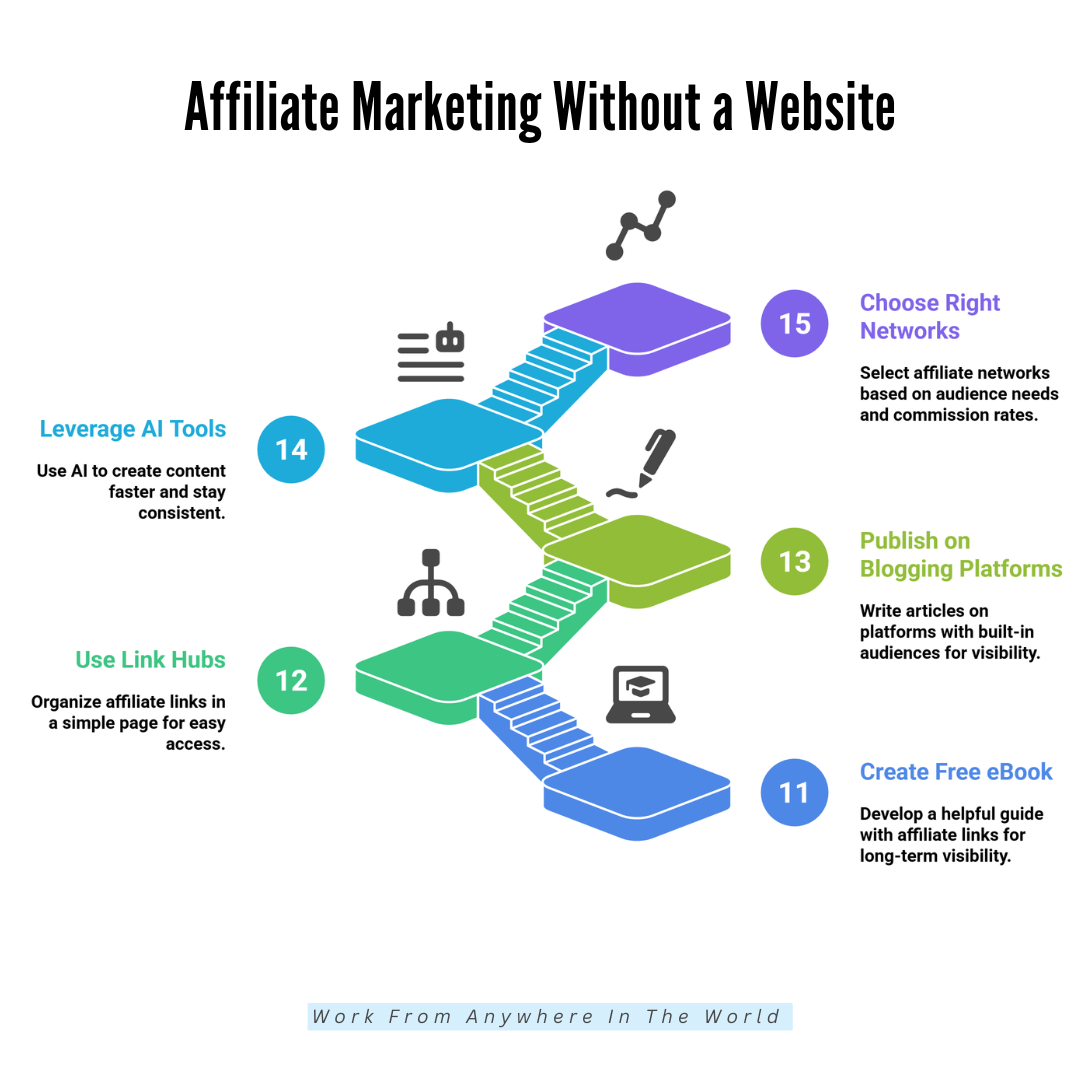
16. Choosing A Profitable Niche
Picking a niche without a website requires simplicity and passion. Choose something you enjoy discussing because you’ll create content regularly.
Look for niches with strong buyer intent like fitness, beauty, pets, tech, gardening, or online tools. Make sure products have competitive prices and good demand. Research what people ask, what problems they face, and what solutions they buy.
A focused niche builds authority faster and helps you understand your audience’s needs. With consistent content, even beginners can create trust and generate affiliate sales easily.
17. Creating High-Converting Content
High-converting content focuses on helping rather than selling. Highlight a problem, explain the solution, and naturally introduce the product. Use simple language, short sentences, and relatable examples.
Tutorials, demos, before-and-after results, and honest reviews convert extremely well. People click when the content feels helpful, honest, and trustworthy. Avoid hype; instead, show how the product solves everyday issues.
Test different formats like videos, carousels, long posts, or quick tips. When content feels genuine and valuable, your audience becomes more likely to purchase through your link.
18. Building Trust And Credibility
Trust is the core of successful affiliate marketing, especially without a website. People only buy from creators they believe in. Be transparent about affiliate links and share honest experiences, including pros and cons.
Use real examples, personal stories, or genuine feedback instead of salesy claims. Show alternatives when possible. Respond to questions, interact with followers, and stay consistent in your niche.
Trust builds over time, and once people see you as a reliable source, your recommendations become powerful. This leads to steady affiliate income across platforms.
19. Tracking Performance And Clicks
Tracking your clicks helps you understand which content performs best. Use tools like Bitly, TinyURL, or affiliate dashboards to monitor link activity. Notice which platforms bring the most conversions and create more content there.
Tracking also helps you avoid wasting time on low-impact efforts. Evaluate what type of posts people engage with, which videos bring clicks, or which answers rank well.
Data-driven decisions help you grow faster. Tracking gives clarity, removes guesswork, and guides your strategy toward consistent, profitable affiliate results without needing a website.
20. Earning Potential Without A Website
Depending on your topic, product prices, content consistency, and audience trust, your monthly income can range from a few dollars to thousands.
High-ticket items like software, tech gadgets, or online tools bring bigger commissions. Digital products often pay more than physical ones. Your results improve as your content library grows.
Each video, answer, or post becomes a small asset generating clicks. Many creators start small but scale quickly once they find what converts. Without a website, your earning potential remains unlimited if your strategy stays consistent.
21. Scaling Your Affiliate Business
Scaling means expanding your reach and refining what already works. Post more frequently, explore new platforms, and grow your niche as needed.
Create short-form videos, helpful PDF guides, or comparison posts to diversify content. Try creating an email list for deeper engagement.
To reach new audiences, work together with other creators. To uncover prospects for bigger commissions, try out different affiliate programs.
Scaling is a gradual process, but small daily steps compound over time. With consistent content and tracking, you can grow steadily without ever building a website.
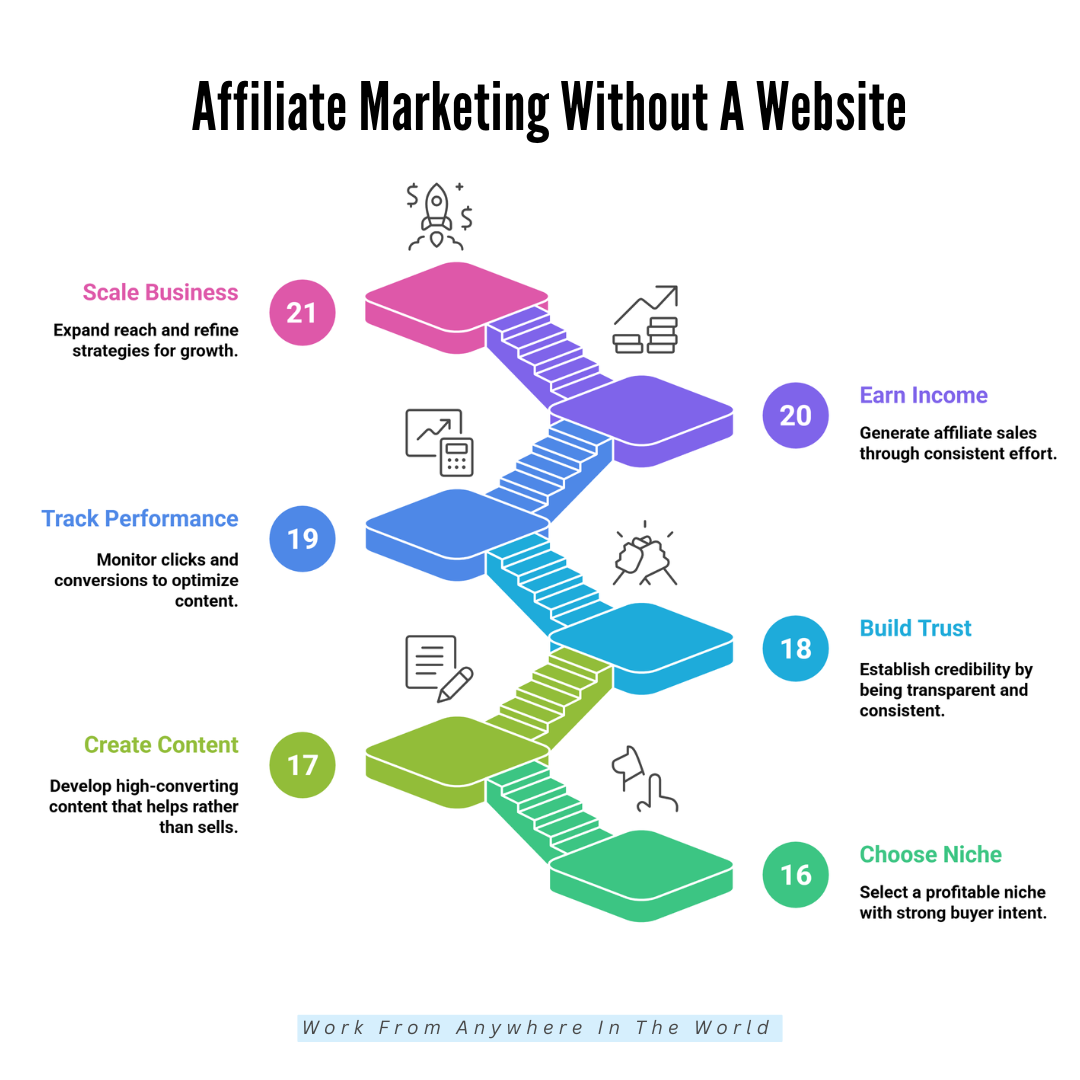
Common Affiliate Mistakes To Avoid
Avoiding common mistakes is key to succeeding with affiliate marketing without a website. When you know what hurts your progress, you can grow faster, build trust, and increase conversions effortlessly.
1. Promoting Too Many Unrelated Products
Beginners often promote every product they find, hoping something converts. But promoting random items only confuses people and kills trust.
Pick one niche and stick to products that truly help your audience. Focused promotions feel more reliable and convert better.
When you understand what you’re promoting, affiliate marketing without a website becomes easier, cleaner, and far more profitable.
2. Ignoring Product Research
Skipping product research is a huge mistake. Many beginners only chase high commissions without checking real reviews, refund rates, or product quality. Promoting unreliable items destroys trust fast, especially when doing affiliate marketing without a website.
Always study the product first. Choose items that solve real problems. Better research builds stronger credibility and increases long-term conversions.
3. Spamming Links Everywhere
Dropping affiliate links in random comments, groups, or inboxes might feel quick, but it ruins your reputation. It looks desperate and often gets you flagged as spam.
Instead, share helpful tips, short insights, or personal results before dropping your link. Provide context and value. When doing affiliate marketing without a website, your content is your brand—keep it clean and trustworthy.
4. Not Tracking Performance
Many affiliates post links everywhere but never track what works. This leads to wasted time and slow progress. Use tracking IDs, link shorteners, or built-in analytics to see which platform or message drives results.
Even without a website, simple tracking tools help you improve, repeat what works, and avoid mistakes. Data makes scaling your affiliate marketing much easier.
5. Choosing The Wrong Audience
Trying to promote to everyone is a common mistake. Without the right audience, even the perfect product won’t convert. Focus on people who actually need the solution you’re promoting.
Understand their pain points, interests, and goals. Whether you're posting on social media or in groups, tailor your message to them. A targeted audience boosts conversions, especially without a website.
6. Not Building Trust First
Promoting too early turns people away. Buyers need trust before they click any affiliate link, especially when you don’t have a website. Share value first—quick tips, mini tutorials, or personal experiences.
Show you understand the problem before offering a solution. The more trust you build upfront, the easier it becomes to convert without sounding salesy or pushy.
7. Relying Only On One Platform
Depending on one platform is risky. If your Facebook or TikTok account gets restricted, your income stops instantly. Spread your content across a few platforms you can handle.
Repurpose one review into posts, reels, or short messages. This protects you from algorithm changes and increases your reach. More platforms mean more chances to convert—without needing a website.
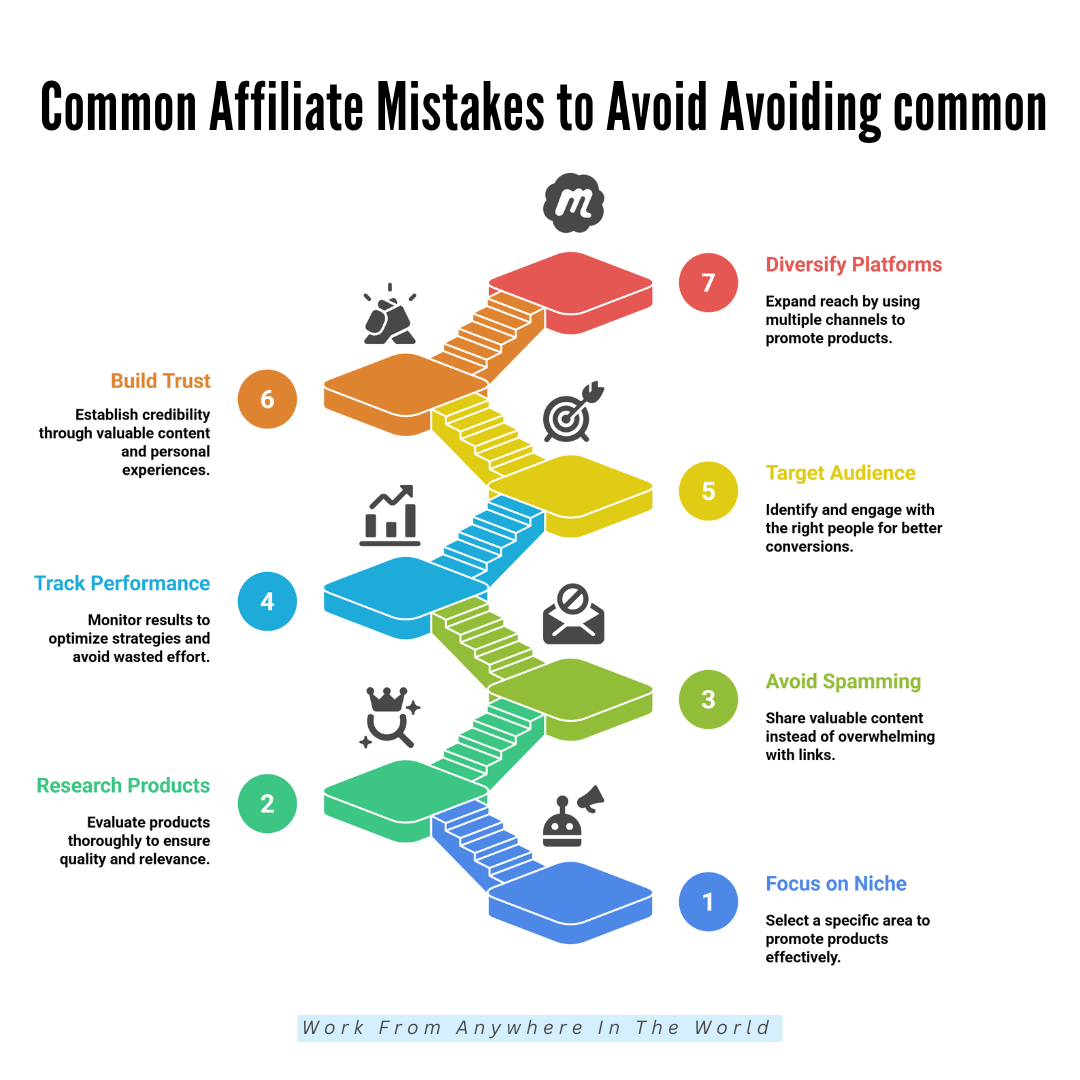
Conclusion
Affiliate Marketing Without a Website gives you a flexible, low-cost way to earn online without dealing with design, domains, or ongoing site management. When you follow the right strategies consistently, your results can grow faster than you expect.
Use the methods in this guide to promote smarter, build trust, and create steady income streams. Start small, stay consistent, and watch your affiliate journey turn into something powerful.
I trust you enjoyed this article on Affiliate Marketing Without A Website: Quick Success Guide. Please stay tuned for more insightful blogs on affiliate marketing, online business, and working from anywhere in the world.
Take care!
— JeannetteZ
💬 Your Opinion Is Important To Me
Do you have thoughts, ideas, or questions? I’d love to hear from you. Please leave your comments below or email me directly at Jeannette@WorkFromAnywhereInTheWorld.com.
📚 More Work From Anywhere Reads
🚀 Ready to Build a Business You Can Run from Home
Or from Anywhere in the World?
Imagine creating income on your terms — from home, a cozy café, or wherever life takes you.
With the right tools, training, and community support, it’s entirely possible.
Start your own online business for free — no credit card needed.
Disclosure
This post may contain affiliate links. As an Amazon Associate and participant in other affiliate programs, I earn from qualifying purchases at no extra cost to you. Please read my full affiliate disclosure.

